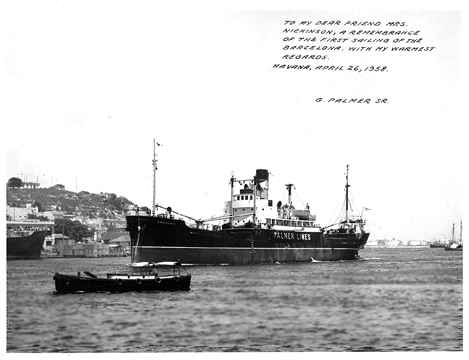Pensacola Port has ties to Cuba trade
- December 17, 2014
- / Carlton Proctor
- / government

President Obama's announcement today the United States is easing trade restrictions on Cuba could mean big business in the near future for the Port of Pensacola.
Prior to Fidel Castro's takeover of the Caribbean island in January 1959, sea-going trade between Pensacola and Cuba had been robust, and stretched back for centuries.
Port of Pensacola Director Amy Miller said the news out of the White House today is promising, but it will take time to sort through the new regulations.
"Of course everything at this point depends on the actual outcome of how the president's policies regarding trade with Cuba will be revised," Miller said. "However, we already have a monthly export liner service out of our port going to various Caribbean ports.
"So, it would be very easy if the revised regulations permitted the vessel operator to visit Cuban ports," Miller said. "I think there's a good opportunity for our Caribbean liner service to expand its operations to Cuba."
Despite the strict U.S. trade embargo on Cuba, the Port of Pensacola has maintained links to the island in recent years.
In early 2000, trade restrictions were eased to allow shipments of food, medicine and building materials to Cuba from U.S. ports.
Miller, who accompanied a Pensacola trade delegation to Cuba in 2000, said the port did secure some business exporting mostly building materials under those relaxed regulations.
More recently, a local poultry exporter shipped food to Cuba out of the port. But that business shut down a few years ago.
In addition to easing trade restrictions, Obama also announced that Americans will now be able to travel to the island for business, educational opportunities or artistic endeavors, and also be permitted to use credit cards while in Cuba.
The breakthrough was the result of 18 months of secret talks hosted largely by Canada and encouraged by Pope Francis.
“We will end an outdated approach that for decades has failed to advance our interests and instead we will begin to normalize relations between our two countries,” the president said in a nationally televised statement from the White House.
The deal will “begin a new chapter among the nations of the Americas and move beyond a “rigid policy that is rooted in events that took place before most of us were born.”
 CivicCon launches with a look at good growth in cities
CivicCon launches with a look at good growth in cities
 Building stronger brains one baby, one parent at a time
Building stronger brains one baby, one parent at a time
 SCI debuts commercial on Early Learning City
SCI debuts commercial on Early Learning City
 Entrecon: World class speakers and an opportunity to sharpen skills
Entrecon: World class speakers and an opportunity to sharpen skills
 PYP Quality of Life survey 2017
PYP Quality of Life survey 2017
 EntreCon Pensacola 2016: A look back
EntreCon Pensacola 2016: A look back
 Leadership tip: getting better employee takeaways
Leadership tip: getting better employee takeaways
 Leadership tip: be interested instead of interesting
Leadership tip: be interested instead of interesting
 Leadership tip: delivering difficult messages
Leadership tip: delivering difficult messages
 Brain Bags boost Arc, Early Childhood Court programs
Brain Bags boost Arc, Early Childhood Court programs